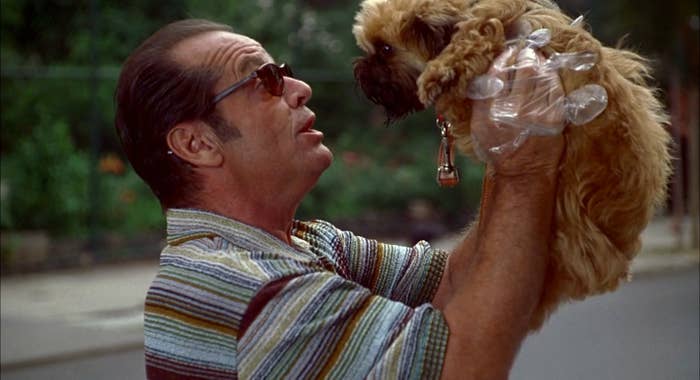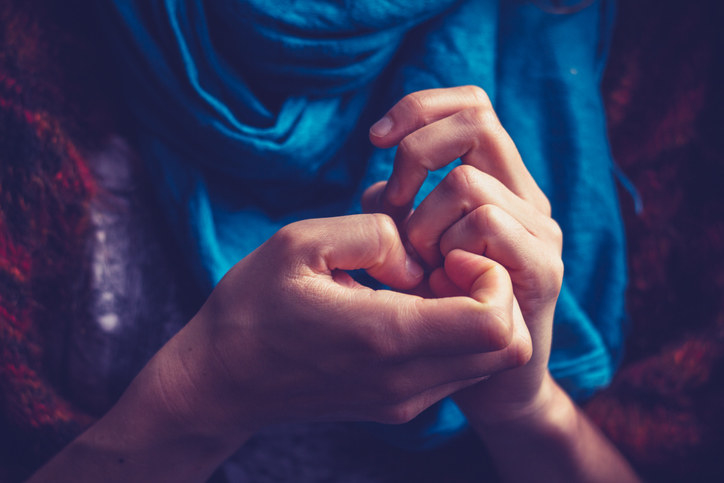1. First and foremost, OCD isn’t necessarily an obsession with cleanliness and order.
Almost every representation of people with Obsessive Compulsive Disorder I’ve encountered portrays us as fearful of filth and obsessed with being clean. Melvin Udall (As Good As It Gets) keeps a stash of soap bars in his bathroom so he can unwrap a fresh one every time he washes his hands. Adrian Monk (Monk) is so crippled by his obsession with “contaminants” that he needs an assistant to perform basic functions, like opening doors.

These representations build on — and give power to — the stereotype that OCD is “just” a fear of dirt and an obsession with order. This limited definition of OCD makes it difficult for people whose OCD manifests in other ways to be recognized. There are few things as frustrating as working up the courage to admit to someone that you have OCD and have them doubtfully respond, “But you’re so messy!”
The crux of the problem with most representations of OCD that revolve around obsessions with cleanliness? They mistake the compulsive behavior for the fear that triggers it.
They also help sustain a culture in which people feel comfortable making offhand comments like, “I’m a little OCD” when they admit that they like to keep a clean house. These comments may seem innocuous, but are minimizing to someone who struggles with OCD because they frame a disease that can be debilitating as a simple issue of being “fussy.”
In reality, OCD is so much more than that. While some OCD patients undoubtedly are obsessed with cleanliness, it is only a side effect of what really goes on in the mind of someone with this disorder.
The crux of the problem with most representations of OCD that revolve around obsessions with cleanliness? They mistake the compulsive behavior for the fear that triggers it. As someone who was diagnosed with OCD at age 11, I can explain.
2. OCD is an anxiety disorder shaped by a "vicious cycle" of fears and ritualistic behavior.
OCD has two basic components: obsessive thoughts and compulsive behaviors. According to the Mayo Clinic, “OCD obsessions are repeated, persistent, and unwanted thoughts, urges, or images that are intrusive and cause distress or anxiety.” These obsessions could be almost anything, but as the Mayo Clinic points out, they often have themes, which could include unwelcome thoughts about traumatic memories or being contaminated by distasteful objects, people, or ideas. Many people with OCD also experience persistent fears that they will hurt themselves or others.
For me, these obsessions usually manifest as irrational fears that I am somehow unsafe. Remember the monsters under your bed when you were a kid? Remember how, no matter how often your parents explained to you that there were no such things as monsters, when they turned off the lights and shut the door, you still had your doubts? Unlike most people, I never grew out of that creeping, irrational sense of danger that, even when all the facts tell me I have nothing to worry about, keeps me believing I’m always at the cusp of peril.
With intrusive thoughts, simply doing some research and discovering that your fears are unwarranted doesn’t help — or it helps for about three minutes until the intrusive thoughts push back in.
Even though I’m not obsessed with monsters under the bed anymore, when something unpleasant comes up, like getting called in for jury duty, my mind automatically brings me to the irrational worst case. The thing is, I have a very hard time discerning between what’s likely — or even possible — to happen and what isn’t.
That’s how I end up crying on my therapist’s couch because I really believe that I’ll be stuck in jury duty for months and will lose my job and my apartment. No matter what she says to allay my fears, I never really believe that I’m safe, so the thought of losing everything keeps returning to consume me. I become absolutely convinced that whatever I’m afraid of will come true.
This is where the compulsive behaviors come in. When you’re drowning in anxiety, you want to be able to do something to control it, right? With intrusive thoughts, simply doing some research and discovering that your fears are unwarranted doesn’t help — or it helps for about three minutes until the intrusive thoughts push back in. Thus, OCD patients develop repetitive behaviors that help us feel like we’re in control, that we’re actively preventing something bad from happening.

3. An OCD patient’s intrusive thoughts can manifest in seemingly unrelated behavior.
Sometimes my compulsive behaviors are a practical response to my anxieties, but usually they’re not.
In the case of the jury duty anxiety (and I should stress that jury duty is not the only thing that triggers my OCD — the list is long, with most items being a little too personal to share publicly), I might stay up far too late combing online forums for horror stories about the jury duty that never ended, or compulsively call my boss, my HR department, and my union to confirm that I’ll still get paid on the days I miss work. These behaviors usually allay my anxiety briefly, until my brain conjures up something else that could go wrong. For example, if HR assures me that I won’t lose my job while I’m on jury duty, I might find myself, half an hour later, on hold with my union because I’ve been overcome with the thought that HR was wrong and I want to confirm that the union will protect me.
Usually, however, my compulsive behaviors have nothing to do in practice with whatever I’m afraid of. This is because they are not a rational response to a real problem – they are compulsive manifestations of an irrational anxiety.
For example, if I’m worried that jury duty will snowball into an apocalyptic scenario of joblessness and homelessness, I might respond to these intrusive thoughts by getting stuck washing my hands over and over because in my irrational mind, washing my hands while envisioning a positive outcome (dismissal from jury duty) will make that outcome a reality. If I spend twenty minutes washing my hands, it’s not because I’m afraid they’re dirty.

4. I do rationally understand that a compulsive behavior won’t solve whatever I’m worried about. That doesn’t mean I can stop.
I often think of living with OCD as having two minds: the rational mind, which knows that hand-washing will have no impact on the outcome of my jury duty, and the irrational mind, possessed by that same monster-under-the-bed terror, that makes the idea of a long jury duty feel like both a catastrophe and something whose outcome could be mitigated by how many times I wash my hands.
Rationally, I know that my compulsive behaviors will have no effect on what I’m worried about. I’m even able to admit this while I’m stuck in a cycle of repetitive behavior. But irrational fear usually wins its battles with my rational mind, and the magical thinking that my compulsive behaviors will keep me safe influences my behavior more often than not.
5. Getting lost in compulsive behaviors can feel like torture.
Unfortunately, the compulsive behaviors my brain uses to process these anxieties often have the effect of intensifying them rather than making them more manageable. They catch me in a cycle where my fears seem immediate, and thus become quickly overpowering. This is how I end up standing in the doorway of my bedroom for five, ten, fifteen minutes past when I wanted to be in bed because I have to keep switching the light on and off until it feels “right.”
OCD is often described as an obsession with control, and it is. But there is a dark side to imagining that you have control over everything.
Even though I consciously know that my bedroom light has nothing to do with what I’m worried about, the little doubt at the back of my mind – But what if it does? What if switching off the light while imagining the perfect outcome will make everything okay? Did you do it right? Did you really imagine it? Do it again – grows louder and more insistent. The more room I give to that doubt, the more urgent the compulsions seem, until the idea that I can make everything okay by switching the light off the “right” way – and, conversely, that everything will be a disaster if I don’t – dominates me.
OCD is often described as an obsession with control, and it is. But there is a dark side to imagining that you have control over everything. I constantly feel the pressure to do even small things, like washing my hands or flipping off the bedroom light, in a way that will magically enact a positive outcome in something I’m worried about.
This makes basic tasks really, really difficult, especially because my compulsive behaviors could be anything. On my good days, I can clean my apartment, organize my desk, and cook dinner with minimal problems. At other times, it takes me hours to do the dishes because I need to put the same cup in the cabinet five times before I feel safe enough to move on. I’ve become a night owl because the process of getting ready for bed – brushing my teeth, taking out the trash, changing into pajamas, turning out the light, getting into bed – can be so time-consuming and stressful that I procrastinate doing it.

6. It is possible to live with OCD and be very high-functioning, especially with the right treatment.
One of the biggest objections I have to the way OCD has been traditionally represented in the media is that, for the most part, characters with OCD are presented as misanthropic, consumed by their obsessions and, even if they’re brilliant or good at their job, are otherwise not equal to the basic challenges life presents.
Surely this is true for some — it has even described me at certain points in my life. But a troubling effect of these representations is that they make an OCD diagnosis seem like a kind of death sentence. When I was diagnosed at age 11, I was terrified it meant that I would not be able to live a full life.
Yet, thanks to consistent therapy and the right dosage of anti-anxiety medication, I am able to keep my OCD in check enough to live a “relatively normal life” (whatever that means). For the most part, the worst of my OCD symptoms don’t come into play when I’m at work or with friends and family. When I started writing about it earlier this year, most of the people in my life were surprised to discover that I have OCD at all.
7. It actually has its benefits.
Would I get rid of my OCD if I could? It’s a moot question: as every therapist, psychologist, psychiatrist, and social worker I’ve seen has reminded me, the goal of OCD treatment isn’t to cure it, but to manage it. However, despite the suffering it has caused me, if someone presented me with a magical cure for OCD and all its related symptoms tomorrow, I would hesitate.
Of course, I would want to get rid of the anxiety, the fact that I can’t really trust myself when assessing risk, the compulsions that occasionally embarrass me in public and keep me up at night. I don’t know what it’s like to encounter the world without an anxiety disorder on my back, and I would like to try it.
At work, I’m the note-taker in every working group, and I stumbled into labor activism because I was anxious about my eligibility for health coverage and annotated the union contract.
But I have also come to understand that the pitfalls of OCD come as part of a larger package. Because I have had OCD from the beginning — and it wasn’t triggered by a specific trauma later in life, as some cases of OCD are — I have developed with and around it. As a result, some aspects of my personality and the way I think are of a piece with my OCD.
From childhood, I have obsessively-compulsively deconstructed and responded to arguments: if I had an opinion about something, I searched ruthlessly for potential counterarguments in order to control the responses of my naysayers before they even opened their mouths. I won awards as a leader of the Model UN debate team at my high school, and now I teach argumentation and rhetoric for a living.
I am meticulously organized, obsessively thorough, and deeply inquisitive. It’s a running joke among my in-laws that, if they want to schedule something with my husband, they should just call me because I’ve got a color-coded calendar that runs six months out. At work, I’m the note-taker in every working group, and I stumbled into labor activism because I was anxious about my eligibility for health coverage and annotated the union contract.
My perfectionism makes me an excellent student and teacher — I am easily engrossed in new tasks, excellent at managing my time and completing projects efficiently, and as a result, am a natural leader and delegator. I have an uncanny memory for dates because I track the landscape of my life in terms of what I was obsessed with at any given point. For example, I remember the exact start date of every job I’ve ever had because I remember the ways that my anxiety about starting new jobs manifested at different points in my life.
It would be shortsighted to say that these attributes are separate from my OCD, because the habits of mind involved in these strengths are very similar (and in some cases, are the very same) as the habits of mind that drive me to brush my teeth five times before going to bed. I’ve come to view OCD as a (very) rough downside to characteristics that I otherwise quite like about myself.
So, while I’d be kidding myself if I claimed that I’d turn down a cure for OCD wholesale, I’ve learned to stop trying to separate my mental illness from the rest of who I am, to be ashamed of it, or to shun it. In some ways, it’s convenient that my OCD isn’t going away, because it means that I can continue to learn to draw on it as a source of strength, while minimizing the ways that it can hurt me.
Shannon Azzato Stephens is a writer based in New York City, where she teaches college-level writing and spends most of her free time at the dog park.
To learn more about OCD, check out the resources at the National Institute of Mental Health here.
And if you need to talk to someone immediately, you can reach the National Suicide Prevention Lifeline at 1-800-273-TALK (8255) and or the Crisis Text Line by texting HOME to 741741. Suicide helplines outside the US can be found here.
Follow along at BuzzFeed.com/MentalHealthWeek from Oct. 2 to Oct. 8, 2017.


